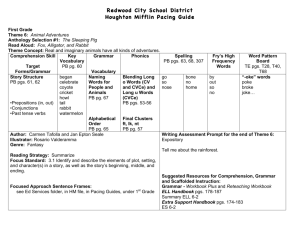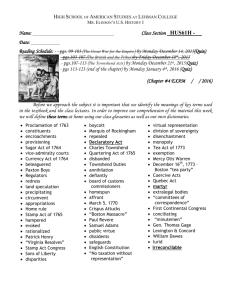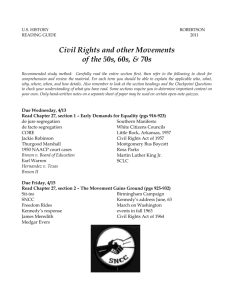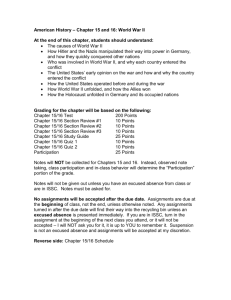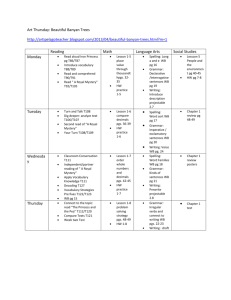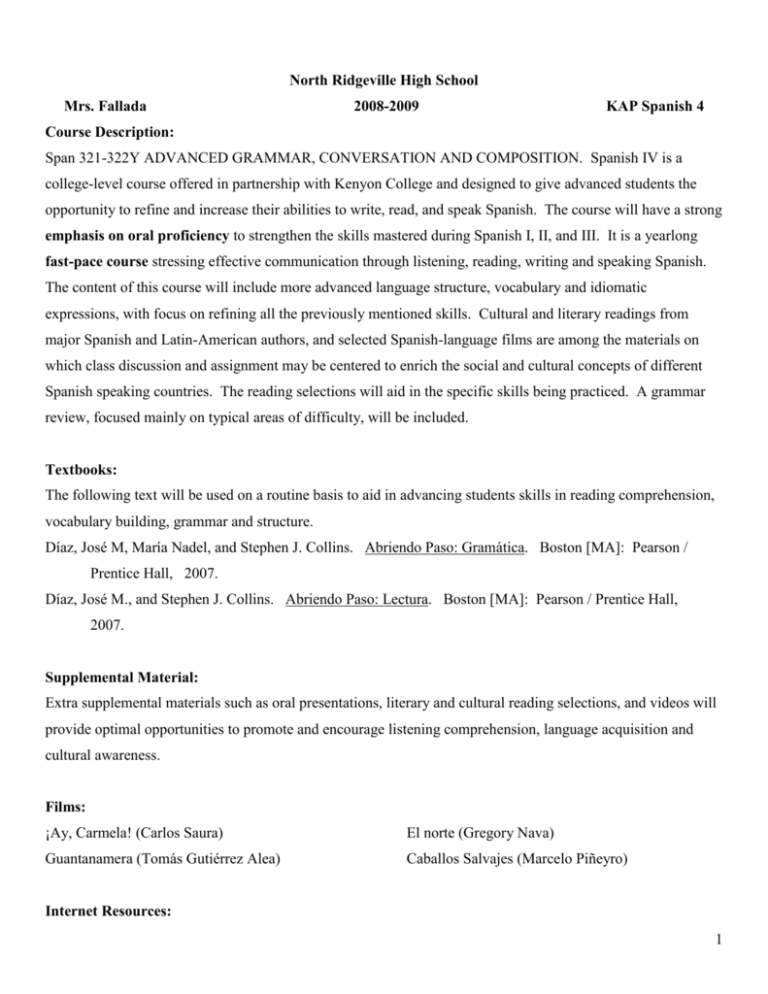
North Ridgeville High School
Mrs. Fallada
2008-2009
KAP Spanish 4
Course Description:
Span 321-322Y ADVANCED GRAMMAR, CONVERSATION AND COMPOSITION. Spanish IV is a
college-level course offered in partnership with Kenyon College and designed to give advanced students the
opportunity to refine and increase their abilities to write, read, and speak Spanish. The course will have a strong
emphasis on oral proficiency to strengthen the skills mastered during Spanish I, II, and III. It is a yearlong
fast-pace course stressing effective communication through listening, reading, writing and speaking Spanish.
The content of this course will include more advanced language structure, vocabulary and idiomatic
expressions, with focus on refining all the previously mentioned skills. Cultural and literary readings from
major Spanish and Latin-American authors, and selected Spanish-language films are among the materials on
which class discussion and assignment may be centered to enrich the social and cultural concepts of different
Spanish speaking countries. The reading selections will aid in the specific skills being practiced. A grammar
review, focused mainly on typical areas of difficulty, will be included.
Textbooks:
The following text will be used on a routine basis to aid in advancing students skills in reading comprehension,
vocabulary building, grammar and structure.
Díaz, José M, María Nadel, and Stephen J. Collins. Abriendo Paso: Gramática. Boston [MA]: Pearson /
Prentice Hall, 2007.
Díaz, José M., and Stephen J. Collins. Abriendo Paso: Lectura. Boston [MA]: Pearson / Prentice Hall,
2007.
Supplemental Material:
Extra supplemental materials such as oral presentations, literary and cultural reading selections, and videos will
provide optimal opportunities to promote and encourage listening comprehension, language acquisition and
cultural awareness.
Films:
¡Ay, Carmela! (Carlos Saura)
El norte (Gregory Nava)
Guantanamera (Tomás Gutiérrez Alea)
Caballos Salvajes (Marcelo Piñeyro)
Internet Resources:
1
www.PHSchool.com
North Ridgeville High School
Mrs. Fallada
2008-2009
KAP Spanish 4
Attendance and Participation:
Learning a language takes practice and the best practice is to listen and use the target language whenever
possible. Class time is the best time to practice the target language, so active participation is vital to the
success of the students’ learning of a foreign language. For this reason, students will receive a language
practice grade. Failure to participate in any activity will result in a deduction of points from class
work/participation grade.
In addition, because language skills are built continuously on a day to day basis, there will be Pop Quizzes to
evaluate the students’ preparedness with the current and past information.
Extra Credit:
Extra Credit will not be offered in this course.
Late Work:
Late work will not be accepted and the student will earn a zero or F for the assignment.
Grades:
Students’ grades will be the result of regular daily participation, class work, homework, writings and speaking
assignments, projects, quizzes and regular tests. Remember, pop quizzes will be also used to assess
preparedness.
The compositions will be graded on content (30pts), organization and communication strategies (30 pts), and
grammar and specific vocabulary to the units studied (40 pts) for a total of 100 pts per essay.
The oral presentations will be graded on extemporaneous speaking (20 pts), pronunciation (30 pts), depth of
discussion (20pts), use of grammar and vocabulary (30 pts) for a total of 100 pts per presentation.
The net worth of the grades will be as follow:
Homework
5%
Projects
10%
Class Work and Participation
10%
Writing
15%
Speaking Assignments
15%
2
Quizzes
20%
Tests
25%
Mrs. Fallada
2008-2009
KAP Spanish 4
The grade scale will be as follow:
93-100 A
90-92 A87-89 B+
83-86 B
80-82 B77-79 C+
73-76
70-72
67-69
63-66
60-62
59-0
C
CD+
D
DF
Final Exam:
At the end of the year the final exam will be comprehensive and it will cover the vocabulary, grammar,
structure and culture covered throughout the year.
Discipline:
The school’s discipline policy, including tardiness, cheating and plagiarism, will be enforced. Please refer to
the Student Handbook for policies concerning all school rules.
Academic Honesty
Plagiarism or the theft of someone else’s ideas, opinions or works can easily be avoided by giving credit to the
author’s works and putting everything from his/her text in quotations. Also, be careful that you are not just
rearranging the author’s words when paraphrasing, but rather carefully choose and use your own words instead.
Also, avoid translators since they cannot always translate correct ideas but rather isolated words. Often
translators make sentences incomprehensible thus compromising your grade for the project or writing
assignments.
Course Syllabus:
This syllabus is divided into weeks of study. However, due to the complexity of studying a foreign language it
is tentative and subject to change.
1st Quarter:
August 28-29
Aug 28: Open House
5:45-7:20
Aug 29: Assembly
Welcome:
Assign seats, get student information, pass syllabus, and collect Summer
assignments.
Review:
Basic vocabulary and grammar.
Los sustantivos pgs 237-249.
3
Abriendo Paso
Unit 1
September 2-5
No class Monday 9/1/08.
Sep 4th: Picture Day.
Abriendo Paso
Unit 1
September 8-12
Abriendo Paso
Unit 1
September 15-19
Homework:
Read information on syllabus.
Read Gramática pgs 237-239.
Write exercises pgs 239-240.
Read “El pretérito” and complete exercises A-D on pgs 1-5.
Quiz:
Questions about the syllabus.
Feminine and masculine nouns.
Lecture:
Más sustantivos pgs 241-243.
Introduction to the culture, customs and music of Spain.
Power Point presentation on the preterite with reviews and discussions.
Explanation of Oral Presentation about a Spanish city (due week of Oct 6-10.)
Reading, Writing and Speaking:
Gramática pg 243 B,244 D-E,
Gramática: “El pretérito” pgs 6-8.
Selected music: flamenco, coplas, paso doble.
Homework:
Read Gramática pg 241-243.
Complete pgs 245 F, 246 H, 247, 248 J.
Gramática: Paginas 30-31.
Miscellaneous preterite worksheets.
Quiz:
Los sustantivos.
El pretérito regular.
Costumbres, cultura y música de España.
Lecture:
El plural de los sustantivos pgs 248.
Review of preterite uses and irregular verbs in the preterite.
Reading. Writing and Speaking:
Gramática pg 249 A.
Gramática: “El pretérito irregular” pgs 31-33.
More about “El pretérito” with miscellaneous worksheets.
Spain’s geography.
Selected music: Sardanas, jota, Celtic.
Homework:
Gramática pgs 249 B and 34-41.
Map of Spain.
Read “Los artículos” pgs 250-252.
Quiz:
Plural de los sustantivos.
El pretérito irregular y con cambios de ortografía.
La geografía de España.
Lecture:
Los artículos definidos pgs 250-252.
Stem-changing verbs in the preterite.
Historia de España.
Reading, Writing and Speaking:
4
Abriendo Paso
Unit 1
September 22-26
Abriendo Paso
Unit 1
Sept 29-Oct 3
Gramática pgs 253 A.
Gramática “Stem changing verbs” pgs 42-44.
Miscellaneous stem changing worksheets.
Spain’s history.
Selected music: chotis, tuna.
Homeworks:
Gramática 253-254 B even numbers, 255 E.
Stem changing in the preterite worksheets.
Read Gramática pgs 8-9.
Packet on Spain’s history.
Quiz:
Definite articles.
Stem changing verbs in the preterite.
Spain historical information.
Lecture:
Artículos indefinidos pg 256.
Gramática: Review of forms and uses of “El imperfecto”
Additional information on the imperfect.
Spain’s literature.
Selected music: zarzuela, popular.
Video clip about “La tomatina”
Reading, Writing and Speaking:
Gramática pg 257.
Gramática pgs 10-11
Miscellaneous imperfect worksheets.
Reading Chapter 25 “La tomatina”. New vocabulary.
Class discussion/debate with exercise C pg 337.
Homework:
Gramática pages 12-15.
Packet on Literatura española.
“La tomatina” read pgs 338-340 (read to become familiar to get the gist of the text).
Estudiar vocabulario de La Tomatina.
Quiz:
Indefinite articles.
The imperfect.
Spanish literature information.
“La tomatina” vocabulary.
Lecture:
Gramática: More on uses of the imperfect.
Gramática: “El pretérito vs imperfecto”.
La tomatina.
Reading, Writing and Speaking:
Gramática pgs 12 D, E and F.
Additional worksheets to practice the preterite vs the imperfect.
Lectura: In class review/discussion of “La tomatina” pgs 338-340.
Debate: Gramática pg 344 A y B.
Vocabulary for “Oda al tomate”.
5
Abriendo Paso
Unit 1
October 6-10
Abriendo Paso
Unit 1
October 13-16
No class Friday 10/17/08
Abriendo Paso
Unit 1
October 20-24
Homework:
Gramática pg 12 F and 13 G.
Comprensión pg 341 exercises A and B.
Estudiar vocabulario volver a leer La tomatina para la prueba.
Leer “Oda al tomate” de Pablo Neruda pg 311.
Read El presente perfecto pgs 16 and 46.
Quiz:
Imperfecto vs Preterito.
Comprehension of La tomatina.
Vocabulary from Oda al tomate.
Lecture:
Gramática: “El preterito vs imperfecto” más práctica.
Gramática: Introduction to “El presente perfecto”.
Reading, Writing, Speaking:
Complete pgs 46-47.
Speaking and Project assignment: Students’ Oral Presentation with Power Point:
Aspectos de España.
Complete pgs 16-19.
Homework:
Read pgs 19 and 47. Also, pg 22.
Complete pgs 20-21
Complete pg 24.
Quiz:
Preterito vs Imperfecto.
Present perfect and Past participles.
Lecture:
Review of Unit 1.
Background information on the Spanish Civil war in preparation for the movie ¡Ay Carmela!
Reading, Writing, Speaking:
Gramática: Practice exercises pgs25-27.
Homework:
Gramática 28 exercise F (choose one out of the four) and H.
Study the preterite, imperfect, present perfect, pluperfect, past participles,
vocabulary for La tomatina and Oda al tomate, feminine and masculine nouns,
definite and indefinite articles, and Aspects of Spain.
Vocabulary for the film ¡Ay Carmela!
Previewing exercises.
Test:
Unit 1 Exam: Grammar and Culture studied.
Cinema for culture and history in context: Spain -¡Ay Carmela!
Reading, Writing, Speaking:
Review of vocabulary for the film ¡Ay Carmela!
Continue with previewing exercises.
Film ¡Ay, Carmela! (Carlos Saura)
First Ensayo Académico: Due Date Wednesday, October 29th.
Homework:
Study vocabulary pertaining to reading of Versos sencillos pgs 297 and 299.
6
Read Lectura pg 295 and 297.
Read Gramática pgs 49, 50, 54, 56,73-76, and 80.
Quiz:
Abriendo Paso
Unit 2
October-27-31
2nd Quarter:
Abriendo Paso
Unidad 2
November 3-7
No class Tuesday 11-4-08
Abriendo Paso
Unit 2
November 10-14
No Quiz this week.
Lecture:
Gramática: “Los adjetivos” y “Los adjetivos demostrativos”
Intro to the history, culture and music of the Spanish countries of the Caribbean.
Introduction to José Martí.
Reading, Writing, Speaking:
Complete in writing Gramática pgs 50, 51 and 52, 55 A, 57 A, 74, 76-77 A-B-C,
and 80 A.
Additional info and worksheets on adjectives and demonstrative adjectives.
Review vocabulary pertaining to “Versos sencillos”
Discuss reading of “Versos sencillos”297 and 299 in class.
Additional information on José Martí.
Selected music: Danzón, son.
Homework:
Gramática pgs 53-54, 55 B, 57 B, 78 D-A, 79, and 81 B.
Read brief history of Cuba and José Martí with questions.
Lectura“Comprensión” pg 298.
Quiz:
Questions on Caribbean history, Martí, Versos sencillos, and adjectives.
Lecture:
Gramática: “Los pronombres demostrativos”
Cuba’s history.
Selected music:, trova, punto guajiro.
Reading, Writing, Speaking:
Gramática pgs 58, 59 and 83.
Extra practice worksheets on the demonstrative pronouns.
Vocabulary pertaining to the reading of “Dos cuentos afrocubanos”.
Discussion on “Dos cuentos afrocubanos” pgs 42-45.
José Martí and his wrtings.
Homework:
Read Gramática pgs 58 and 82.
Complete Gramática pgs 60, 84.
Read Fuentes - “Dos cuentos afrocubanos pgs 42-45 to get gist of story.
Complete ¿De qué se trata? pg 45 in writing.
Quiz:
Pronombres demostrativos, vocabulary of “Dos cuentos afrocubanos”, Martí.
Lecture:
Gramática: “Los adjetivos posesivos”.
Cuba’s geography.
Selected music: Bolero, mambo, cha cha chá.
Introduction to Nicolás Guillén.
Reading, Writing, Speaking:
Gramática pgs 62, 63, 86, 87 B.
7
Abriendo Paso
Unit 2
November 17-21
Abriendo Paso
Unit 2
November 24-25
Thanksgiving Break
11/26-28/08
Abriendo Paso
Unit 2
December 1-5
Vocabulary pertaining to reading.
Discussion of the poem “Canción de cuna para despertar a un negrito”.
Homework:
Read Gramática pgs 61-62 and 85-86.
Complete Gramática pgs 64 D, 87 C-D.
Read “Canción de cuna” to get gist and be ready to discuss in class.
Quiz:
Possessive adjectives, Cuba’s geography, new vocabulary, and Guillén.
Lecture:
Introduction to and uses of “Los pronombres posesivos” y Comparaciones”
Introduction to the history of República Dominicana history.
Read TBA
Reading, Writing, Speaking:
Gramática pgs for pronouns 64-65 A y B, 66 D, 88 A, 89 D.
Gramática pgs for comparissons 68-69, 92-93.
Vocabulary pertaining to reading.
Selected music: Merengue, bachata.
Discussion of reading.
Homework:
Read Gramática “Los pronombres posesivos” pgs 64 and 88. Complete in writing
65-66 C and D.
Read Gramática “Comparaciones” pgs 66-67 and complete in writing 70 C and D,
94 E.
Read TBA reading selection
Quiz:
Possessive pronouns comparisons, Dominican Republic’s, new vocab.
Lecture:
Subject and Prepositional Pronouns.
Reading TBA
Reading, Writing, Speaking:
Gramática pgs 259 and 261,
More information and miscellaneous worksheets on subject and prep pronouns.
Dominican Republic’ geography.
Selected music: bachata, criolla.
Discussion on announced reading.
Homework:
Read pgs 258 and 259, 260 and 261.
Complete pgs 260 C and 262 C.
Read TBA reading selection.
Quiz:
Subject and Prepositional Pronouns, Map of Dominican Republic.
Lecture:
Review of Unit 2.
Background information on the Cuba’s economic, religious and social prctices in
preparation for the movie – Guantanamera.
Reading, Writing, Speaking:
Review exercises on adjectives (regular, possessive and demonstrative), pronouns
(demonstrative and possessive) and comparisons.
8
Abriendo Paso
Unit 2
December 8-12
Abriendo Paso
Unit 3
December 15-19
Christmas Break
12/22/08-1/2/09
Practice exercises pgs 71-72.
Homework:
Study the adjectives, pronouns and comparisons, vocabulary for Versos sencillos,
Canción de cuna, Dos cuentos africanos, biographical information on Martí and
Guillen. Also, aspects of Cuba and Dominican Republic.
Vocabulary for the film Guantanamera.
Previewing exercises.
Test:
Unit 2 Exam: Grammar and Culture studied.
Cinema for culture and history in context: Caribbean – Guantanamera.
Reading, Writing, Speaking:
Review of vocabulary for the film Guantanamera.
Continue with previewing exercises.
Film Guantanamera (Tomás Gutiérrez Alea)
Second Ensayo Académico: Due Date Wednesday, December 17th.
Homework:
Study vocabulary pertaining to assigned reading.
Read / Review Gramática pgs “El presente” pgs 95, 96, 98, 99, 102, 118, 119,
120, 122, 124, 126, 128, and 129.
Quiz:
No Quiz this week.
Lectura:
Reintroduction to “El presente indicativo and El progresivo” pgs 95-132.
Cultural and historical concentrations: Puerto Rico’s history.
Selected music: plena y bomba.
Reading, Writing, Speaking:
Complete pgs 97-100, 102-105, 107-108,
Vocabulary pertaining to reading.
Federica García Lorca pg 291.
“Canción de jinete” pg 293.
“Un paso más” exercise A pg 294.
Homework:
Complete pgs 101 C, 106,
Quiz:
.
9
Abriendo Paso
Unit 3
Selected music:
Regetón Abriendo Paso – Gramática:
Unidad 4: “Como expresar deseos y obligaciones: El imperativo” pgs 133-137,
pgs 154-158 and extra activities sheets.
January 5-9
Cultural and historical concentrations:
Speaking assignment: Students’ Oral Presentation with Power Point Project:
Aspectos del Caribe.
Abriendo Paso
Unit 3
Quiz: Grammar studied.
January 14th.
Abriendo Paso – Gramática
Unidad 4: “Deseos y obligaciones: El imperativo” pgs 138-142 and pgs 158-165.
January 12-16
Cultural and historical concentrations:
Speaking assignment: Students’ Oral Presentation with Power Point Project:
Aspectos del Caribe.
Cinema for culture and history in context:
Vocabulary for the film “Guantanamera”.
Previewing exercises.
Abriendo Paso
Unit 3
January 20-22
No class Monday 1/19/09
No class Friday1/23/09
Quiz: Grammar and Culture studied.
January 22nd.
Cinema: The Caribbean.
Review of film’s vocabulary.
Previewing exercises.
Film ¡Ay, Carmela! (Carlos Saura)
Second ensayo académico: Due Date January 24th.
End of 1st Semester
3rd Quarter: Abriendo Paso – Gramática
January 26-30
Power Point Presentation on the subjunctive.
Unidad 4: “El subjuntivo” pgs 142-144 with additional information
and worksheets.
Abriendo Paso – Lectura:
Vocabulary pertaining to reading.
10
“Antes de leer” exercise A and D pgs 347-348.
“Los indios kunas” pg 349.
Cultural and historical concentrations:
Mexico and Central America: Mexico’s geography and history.
Selected music:
Norteña, mariachi, corridos.
February 2-6
Quiz: Grammar and Culture studied.
February 4th.
Abriendo Paso – Gramática
Unidad 4: “El subjuntivo” pgs 144-150 and pgs 166-169.
Abriendo Paso – Lectura:
“Los indios kunas” pg 350-351.
Cultural and historical concentrations:
Mexico and Central America: Guatemala’s geography and history.
Selected music:
Marimba.
February 9-13 Quiz: Grammar and Culture studied.
February 11th.
Abriendo Paso – Gramática
Unidad 4: “El subjuntivo” pgs 150-153 and pgs 69-172.
Abriendo Paso – Lectura:
“Los indios kunas” pg 352-353.
Comprensión: Exercise A pg 354.
Cultural and historical concentrations:
Mexico and Central America: El Salvador and Honduras’ geography
and history.
Selected music:
Garifuna reitoca, chanchona.
February 1720
Quiz: Grammar and Culture studied.
February 19th.
Abriendo Paso – Gramática
No class Monday 2/16/09
11
Unidad 4: “El presente perfecto de subjuntivo” pgs 172-173 and pg
172.
Review of Unit 4.
Abriendo Paso – Lectura:
“En contexto” exercise F pg 355-356.
Para conversar: A. Un pedido pg 356.
Para escribir: Choose exercise A, B or C as the theme for your essay.
Above Essay due February 25th.
Cultural and historical concentrations:
Mexico and Central America: Nicaragua’s geography and history.
Selected music:
Punta, soca.
February 2327
Exam: Grammar and Culture studied.
February 25th.
Abriendo Paso – Gramática:
Unidad 5: “La narración y la descripción en el futuro” 174-182 and
pgs 203-204.
Abriendo Paso – Lectura:
Vocabulary pertaining to reading.
Federico García Lorca. Review.
Antes de leer: exercise B pg 292.
Cultural and historical concentrations:
Mexico and Central America: Costa Rica’s geography and history.
Selected music:
Guanacaste.
March 2-6
Quiz: Grammar and Culture studied.
March 3rd.
Abriendo Paso – Gramática
Unidad 5: “Usos del subjuntivo” pgs 182-193 and pgs 205-206.
Abriendo Paso – Lectura:
“Canción de jinete” pg 293.
Compresión pg 294.
12
“Un paso más” exercise B pg 294.
Cultural and historical concentrations:
Mexico and Central America: Panama’s geography and history.
Selected music:
Amanojá, atravesaó.
March 9-13
Quiz: Grammar and Culture studied.
March 10th.
Abriendo Paso – Gramática
Unidad 5: “Uses of the subjunctive” pgs 194-202.
Cultural and historical concentrations:
Speaking assignment: Students’ Power Point Project: Aspectos de
México y Centro América.
March 16-20
Quiz: Grammar and Culture studied.
March 17th.
Abriendo Paso – Gramática
Unidad 6: “La narración y la descripción en el pasado (ii) pgs .207214 with additional information and exercises.
Review of Unit 5.
Cultural and historical concentrations:
Students’ Oral Presentation with Power Point Project: Aspectos de
México y Centro América.
Cinema for culture and history in context:
Vocabulary for the film “El norte”.
Previewing exercises.
March 23-27
Quiz: Grammar and Culture studied. .
March 31st.
Cinema: The Caribbean.
Review of film’s vocabulary.
Previewing exercises.
Film “El norte” (Gregory Nava).
Third ensayos académicos: Due Date April 4th.
13
4th Quarter:
March 31 April 3
No class Monday 3/30/09
Abriendo Paso – Gramática
Unidad 6: “Conditions: If clauses” 215-219 and pgs 228-233.
Abriendo Paso – Lectura:
Vocabulary pertaining to reading.
José Bernardo Adolph pg 118.
Antes de leer, exercise A and B pg 114, 115 and 116.
Cultural and historical concentrations:
Sur América: Venezuela and Colombia.
Selected music:
vallenato, cumbia.
April 6-9
No class Friday 4/10/09
Quiz: Grammar and Culture studied.
April 14th.
Abriendo Paso – Gramática
Unidad 6: “El condicional” pgs 220-227.
Abriendo Paso – Lectura:
“Nosotros, no” pg 119-120.
Cultural and historical concentrations:
Sur América: Ecuador, Perú and Bolivia.
Selected music:
Peruvian waltz, huayno, marinera/zamacueca.
April 20-24
Quiz: Grammar and Culture studied.
April 21st.
Abriendo Paso –Unidad 6
Gramática: “El condicional y el condicional perfecto” pgs 233-236.
Review of Unit 6.
Abriendo Paso – Lectura:
Comprension, exercise A, B and D pg 121-122.
Cultural and historical concentrations:
Sur América: Chile and Argentina.
Selected music:
14
April 27-30
No class Friday 5/1/09
Cueca, tonada, mapuchina, tango, gaucho, milonga.
Exam: Grammar and Culture studied.
April 28th.
Abriendo Paso –Paso 10
Power Point Presentation on Por and Para.
Gramática: “Por and para” pgs 309-311
Abriendo Paso – Lectura:
Comprensión auditiva: Selección 2 pg 132.
Para escribir: “Mi propio cuento”. Use exercises E, pg 130, to write
an essay. Due May 5th.
Cultural and historical concentrations:
Sur América: Paraguay and Uruguay.
May 4-8
Selected music:
Danza paraguaya, galopas, candombe, murga.
Quiz: Grammar and Culture studied.
May 5th.
Abriendo Paso – Un poco más de práctica.
Part A: Paragraph Completion (with root words) pgs 312-315.
Part E: Formal Oral Presentation (integrated skills) pgs 360-368.
Cultural and historical concentrations:
Speaking assignment: Students’ Oral Presentation with Power Point
Project: Aspectos de Sur América.
May 11-15
Cinema for culture and history in context:
Vocabulary the film “La historia oficial” (Luís Puenzo).
Previewing exercises.
Students’ Power Point Project: Aspectos de Sur América.
Cinema: South America.
Review of film’s vocabulary.
Previewing exercises.
Film “La historia oficial” (Luís Puenzo).
Fourth ensayo académico: Due Date May 16th.
May 18-22
Review for final Exam.
May 26-29
Final Exams.
No class Monday 5/25/09
15
Graduation June 2009.
End of 2nd Semester – End of School Year 2008-2009.
16




